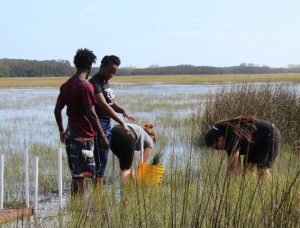ESA Receives NSF Award to Transform Ecology Education
by Jessica Johnston, Education Programs Coordinator
 The ecology education world is about to go multidimensional with the help of a $499,700 award from the National Science Foundation to support ESA’s new research coordination network, Transforming Ecology Education to 4D (TEE).
The ecology education world is about to go multidimensional with the help of a $499,700 award from the National Science Foundation to support ESA’s new research coordination network, Transforming Ecology Education to 4D (TEE).
TEE seeks to establish a new network of faculty to catalyze the adaptation and adoption of curricular materials aligned to ESA’s Four-Dimensional Ecology Education (4DEE) framework. A key component of the program includes fostering inclusive practices for diverse student populations to engage in ecology both online and on campus. ESA and the new TEE research coordination network will work with existing biological education networks to accelerate the use of the 4DEE framework.
TEE’s nine-member steering committee1 includes members of ESA’s 4DEE subcommittee2, the American Indian Higher Education Consortium (AIHEC), Historically Black Universities and Colleges (HBCUs) and Biodiversity Literacy for Undergraduate Education (BLUE) Data Network.

2016 SEEDS participants conduct an ecology field exercise in Whitney Lab, Florida. Photo courtesy of ESA.
TEE steering committee member and 4DEE subcommittee chair Luanna Prevost shared her thoughts about the potential impact of TEE: “We’ve been focused on building awareness of the 4DEE framework for quite some time, so it’s exciting to be entering into this new phase of creating curricular materials, assessment tools and professional development resources to support implementation with the help of multiple education networks. I look forward to seeing the products of this effort reshape how ecology is taught in courses across the nation.”
Newly developed teaching resources will be published and cataloged in ESA’s EcoEd Digital Library.
To help implement consistent and effective incorporation of 4DEE into undergraduate biology and ecology and environmental science classes, TEE plans to host Faculty Mentoring Networks (FMNs) over the next four years in collaboration with AIHEC, BLUE Data Network and others.
The new TEE network seeks to create a diverse STEM workforce literate about our changing ecological systems. “Fostering inclusive practices as faculty build important big ideas and human-environment interactions into their teaching is essential for the field to grow and remain relevant,” said Teresa Mourad, ESA’s director of education and diversity programs and principal investigator for the project. “TEE presents an opportunity to explore the unique role of a disciplinary society in encouraging teaching innovation,” she added.
The project will allow ESA to explore how faculty perception of ecology education is impacted by a society-endorsed framework, and test strategic methods to engage and motivate the community.

Faculty discussing at the 2021 Life Discovery-Doing Science Biology Education Conference in Estes Park, Colorado. Photo courtesy of ESA.
1TEE Steering Committee Members: Teresa Mourad, Principal Investigator, Ecological Society of America; George Middendorf, Co-Principal Investigator, Howard University, Emeritus; Alan Berkowitz, Cary Institute of Ecosystem Studies; Carmen R. Cid, Eastern Connecticut State University, Emeritus; Ken Klemow, Wilkes University; Anna Monfils, Central Michigan University; Al Kuslikis, American Indian Higher Education Consortium; Amy Lesen, Dillard University; Luanna Prevost, University of South Florida
24DEE Subcommittee Members (2021): Luanna Prevost, Chair, University of South Florida; George Middendorf, Howard University; Alan Berkowitz, Cary Institute of Ecosystem Studies; Jennifer Doherty, University of Washington; Ken Klemow, Wilkes University; Amanda Sorensen, Michigan State University; Justin St. Juliana, Cornell University; Christopher Beck, Emory University; Vikki Rodgers, Babson College.